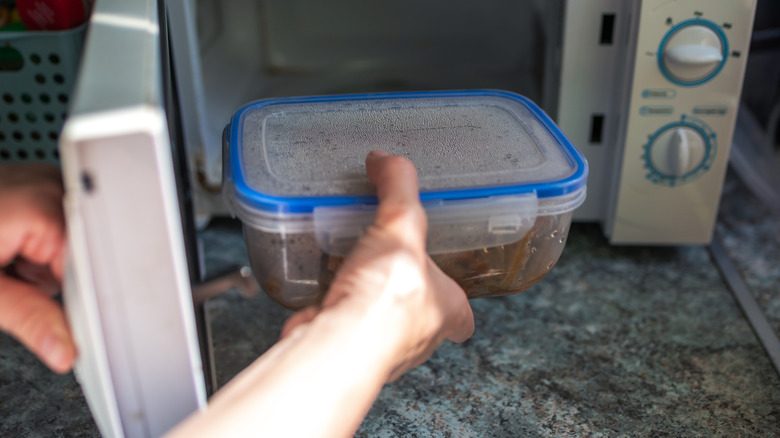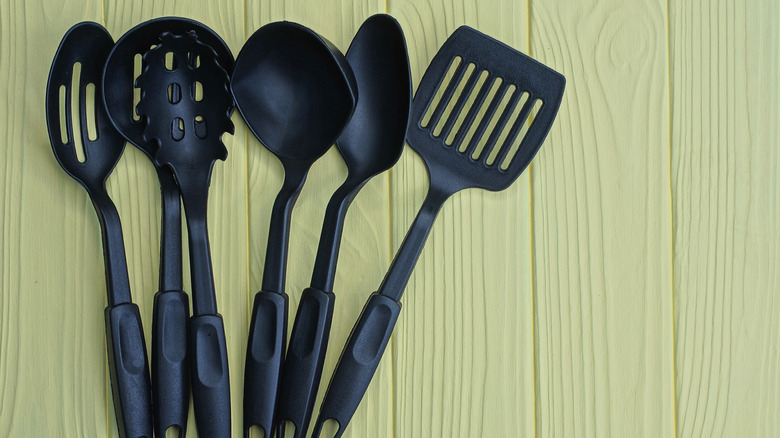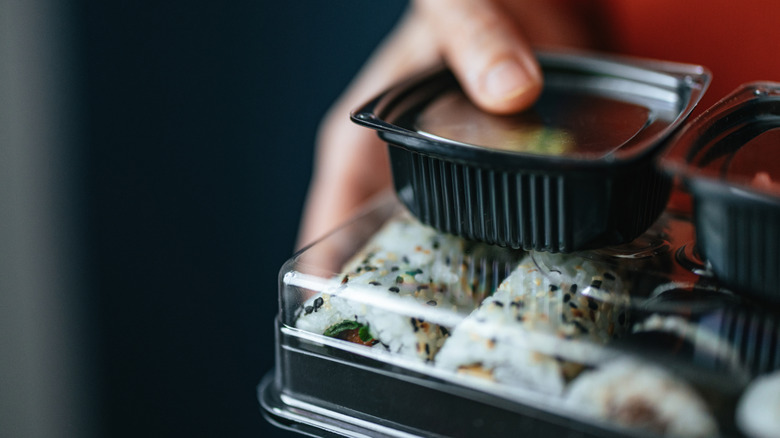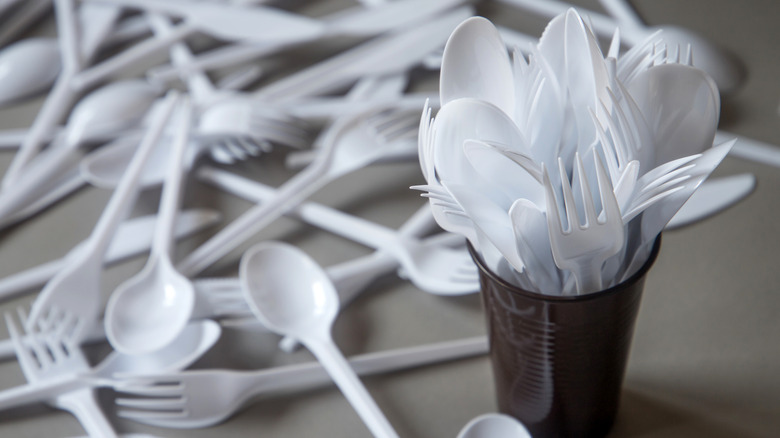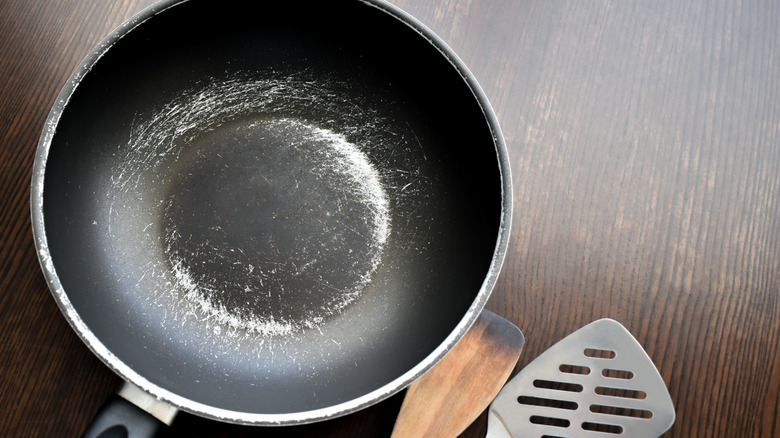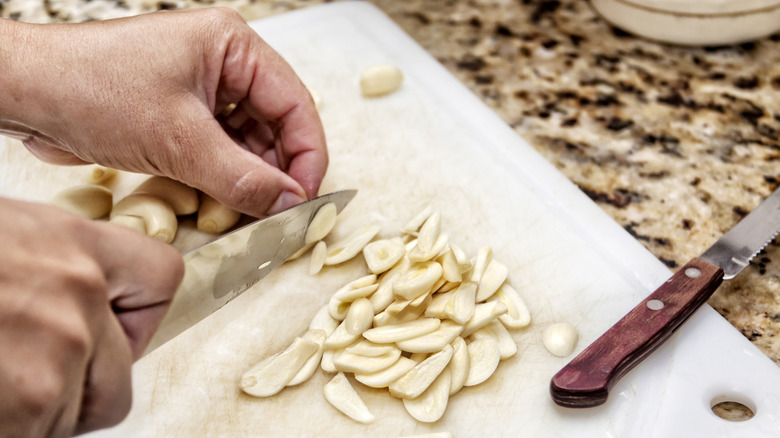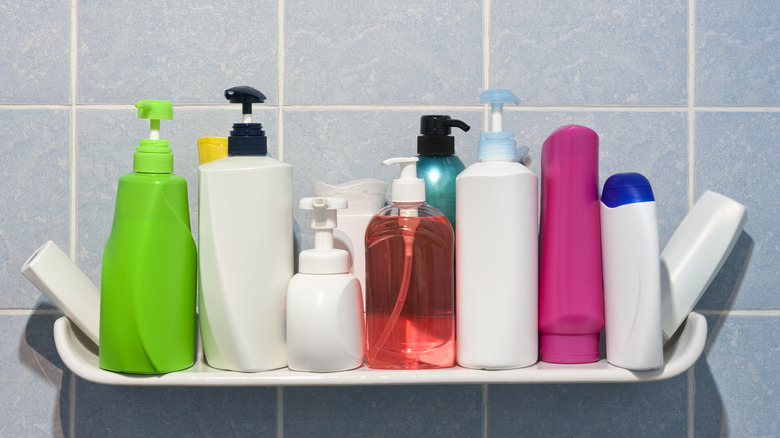Clean Up Your Home By Throwing Out These 9 Toxic Household Items
We may receive a commission on purchases made from links.
Let's face it, we all love the convenience of using plastics around the house. From easy clean-up to handy storage and inexpensive and lightweight cooking gear, it's not uncommon to open your drawers and cabinets and find plenty of plastic lurking inside. But these conveniences can come with some pretty steep health costs — and may even be toxic in some cases. Before you reach for your favorite cooking utensils, storage containers, water bottles, and shampoos, consider some of the dangers these items may be posing to you and your family's health.
According to the Journal of Food and Science, microplastics can enter the human body through food, air, water, food and beverage packaging, processing, and storage. It's estimated that as many as 52,000 microplastic particles are ingested per person every year. These particles contain toxic chemicals that are harmful to us, mimicking hormones that affect our metabolisms and reproductive processes. They can also cause cancer and even possibly dementia . These toxins have been found in our bloodstreams, placental material, organ tissues, and breastmilk. Another danger lurking in the home is products made with phthalates (pronounced THAL-eights). These are chemicals that are used in fragrances or added to plastics to make them pliable. Think everyday items like shower curtains and shampoo bottles.
There may be no way to avoid contact with these types of toxins altogether, but kitchens and bathroom are household areas where we can easily identify and remove many sources of them before they can get into our bodies. Here are nine common household items that you may want to replace ASAP, along with some suggestions of healthier alternatives to try instead.
Black nylon kitchen utensils
Black nylon utensils are being replaced in kitchens across the globe after the news dropped that they have the potential to be harmful to our health, though some experts believe the results were somewhat exaggerated. Either way, all those spatulas, flippers, and stirrers could possibly contain banned toxic chemicals such as flame retardants and heavy metals, because many of them are made from improperly recycled materials like old electronics. When these utensils are heated during cooking, they release these toxic byproducts directly into your food. Plastic kitchen utensils can also melt while cooking, leaching microplastics into your food as well. Instead of plastic, try metal or wooden utensils like these natural teak wood options from Mooues Store.
Shower curtains and bath mats
The vinyl that's used to make products like shower curtains and non-slip bath mats often contain harmful plastic chemicals in the form of phthalates. Vinyl gives the shower curtain its waterproof pliability and offers bathmats and bath rugs their sticky surfaces to keep them in place. While these are very convenient features, they're not entirely necessary as you build a healthier home. Swap that vinyl shower curtain out with a durable, breathable, mold-resistant fabric like linen, hemp, or cotton. Because these are not waterproof fabrics, you'll need to watch for signs of mildew and launder regularly. As for your bath mats and rugs, try some made with natural fibers like cotton or bamboo and natural rubber instead of vinyl.
Plastic water bottles and cups
We see plastic water bottles everywhere! Whether single-use or the reusable sports bottle type, they're all potentially leaching plastic into your beverage and your mouth. The single-use bottles are labeled with a #1 on the bottom and should never be reused. Just toss them in the recycling bin! But even some of the harder, reusable plastic bottles could have Bisphenol A (BPA) in them, which is a synthetic chemical that's been linked to cancer and metabolic problems. When these bottles are heated or scratched, they can contaminate your beverage even more. The same goes for plastic cups in your cabinet. Glass is always better for drinking. But when you're out and about, a healthier alternative to plastic water bottles is stainless steel, like the ever-popular Stanley Quencher.
Take-out containers
It's so tempting to hold onto those plastic containers and lids we get from restaurants and grocery stores. It might even make us feel a little less guilty about bringing them home in the first place. But these are single-use containers and should not be washed and used again. According to a 2024 medical journal report, plastic takeout containers leach chemicals and metals into the food they hold. And even more so when they're heated or chilled. If you can't stomach the thought of throwing these away after one use, it's recommended to wash them by hand, but immediately dispose of them if you see cracks or scratches.
Single-use utensils
We mentioned black nylon utensils earlier, but what about plastic knives, forks, and spoons — a.k.a. "plasticware?" These are also considered single-use plastics, meaning (you guessed it!), it's not wise to wash and reuse them. When these items that are made from polystyrene come in contact with detergents and hot water, they degrade and begin to leach plastic. They can also hold onto food in their small crevices, becoming unhygienic even with thorough washing. Normally, polystyrene is highly recyclable. However, they're not accepted in most curbside recycling programs and plasticware commonly ends up in landfills. Unfortunately, it takes about 200 years for these items to decompose, so best to use metal or something like Go Go Green compostable cutlery whenever possible.
Nonstick pans
You are probably familiar with the idea that nonstick pans are a big kitchen no-no. But many people still have at least one anyway because they're so convenient! Nonstick coatings are well known for containing cancer-causing chemicals called PFAS and as they become scratched, they can also contaminate your food with microplastics. This can harm the respiratory tract and even cause asthma. If you just can't toss the Teflon, try top-rated ceramic nonstick cookware or aluminum-based nonstick pots and pans, and keep your temperature under 250 degrees. Also, ditch the metal utensils for silicone or wood.
Single-use coffee pods
We know that single-use coffee pods are wasteful, but all that plastic could be taking a toll on your body, too. A team of scientists from the University of Connecticut took a close look at coffee pods and discovered that the plastic releases chemicals that mimic human hormones. These "endocrine disruptors" can lead to fertility problems, early puberty, and some cancers. Although it's in very small amounts, repeated exposure from coffee pods and other plastic food packaging can add up in the body over time. The healthier alternative? Literally any other way of making coffee at your work or home coffee station.
Cutting boards
When you're in the midst of meal preparation, you're probably not thinking too much about the cutting board you've chosen. And you may be following the age-old advice to cut meat on a plastic cutting board. However, a 2023 research article published in an environmental science journal claimed that plastic cutting boards are "a substantial source of microplastics in human food." And, an often overlooked one, at that. Where do these plastic flakes go? Right into the food being chopped. If you have a plastic cutting board that's showing signs of age, it's time to toss it. The best cutting boards are stylish-looking wooden chopping blocks anyway.
Personal care products
No one wants to admit that the creams, soaps, and other items we slather on our bodies could be harming us, but it's worth looking at our personal care products and seeing if there are better alternatives available. Items like shampoos, lotions, and powders that contain fragrances often contain phthalates, as do items that come in flexible plastic bottles. It's best to try and avoid scented items, as well as bottles containing the recycling symbol with the number 3 inside of it. Whenever possible, buy and store your personal care items in glass bottles. The good news is, you can reduce the amount of these chemicals in your body very quickly with just a few simple changes to your lifestyle.
